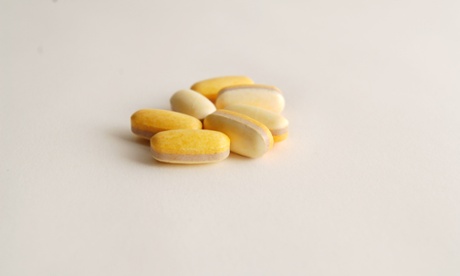In a game of cat and mouse with health and safety officials, Americans profit off panic with modern versions of snake oil treatments, like vitamins branded ‘Ebola-C’

First of all, Steve Barwick wants you to know that Ebola is a government conspiracy.
“This current ‘Ebola crisis’ is … a massive psy-ops campaign,” he wrote in an (undated) blog post on his website, The Silver Edge. “In other words, the threat is largely being manufactured and planted into the minds of the American public, through the federal government/news media axis.”
Barwick, to his credit, points out correctly that the likelihood of coming in contact with an Ebola victim is “about zero”. But that doesn’t stop him from quickly moving on to the hard sell.
“Back in 2008, the US Department of Defense (DOD) in conjunction with several other federal agencies quietly conducted clinical research into the use of silver nanoparticles against Ebola and other hemorrhagic fever viruses,” he claims. “And what they found was astonishing. They discovered that silver nanoparticles were highly effective against these deadly viruses, including the Ebola virus.”
Of course, silver nanoparticles are not highly effective against Ebola – they are not effective at all, in any meaningful sense. Nor is homeopathic rattesnake venom, or oil extracted from sandalwood or cinnamon bark. Nor is vitamin C, in any way other than being simply part of a healthy diet.
But all of the above have been, and are still being sold, both implicitly and explicitly, as preventative measures for Ebola in the US.
Whenever there is a crisis, profiteering is rarely far behind. The attorneys general of several states – New York, North Carolina and Florida among them – have issued warnings about scams relating to the disease. “New Yorkers should beware of fundraising solicitations and offers of goods and services related to Ebola,” said New York’s attorney general Eric Schneiderman. “Scammers are shamefully exploiting this moment of heightened concern about public health to defraud good people.”
Todd Spinelli, a New Yorker, claims to have made $1.4m from a rebranded version of an ordinary vitamin C supplement. His product, “Ebola-C”, makes no claim to medical powers other than those that might be implicit in the name – but that hasn’t stopped Spinelli selling 45,000 units since having the idea at the beginning of October.
Spinelli told the Guardian that he was inspired by an episode of the TV health show Dr Oz, and that he’s planning to sell “Ebola-C shots” as an energy drink. “Obviously there’s people saying ‘you’re trying to make money out of fear,’” he said, “but it’s the same way [vitamin C product] Emergency did. It’s not an emergency – it’s just Vitamin C.”
Gary Cudy, the national health fraud coordinator at the Food and Drug Administration, says the emergence of scammers is not a surprise. “Every time there’s a new emerging public health risk we see fraudulent products that claim to treat it appear overnight,” he told the Guardian.
It is his team’s job to surf the internet looking for products that are making fraudulent claims, scouring social media, eBay and e-commerce sites, even Youtube videos. “That’s often where these kinds of products appear first,” Cudy said.
There are, as Cudy points out, currently no FDA-approved treatments or vaccines for Ebola, so anything that makes claims of curing it on its packaging is considered an unapproved drug. His first step, when the FDA have identified an offender, is to send a warning letter to the company.
They have so far sent three of those during the current outbreak: two to Young Living and dōTERRA International, companies selling Ebola cures based on “essential oils” derived from things like cinnamon bark, peppermint, sandalwood, eucalyptus and rosemary, and another to Rima Laibow, of an organisation called the Natural Solutions Foundation. That last letter pointed to more than 30 violations in which Laibow directly claims that various types of “nano silver” – also known as colloidal silver – is a direct cure for Ebola.
“Colloidal silver is a case where with pseudo-scientific lingo [scammers] can spin a web,” said Joe Schwarcz, director of the office for science and society at McGill university. “They say silver has anti-microbial properties; which is true.” He points out that it is often woven into the fibres of socks to kill bad odors. “But they will lead people down the garden path to tell them it can cure the virus,” he said. “That’s a long way from deodorising socks.”
“What drives people is pretty clear, it’s money,” said Schwarcz.“Fear tends to open peoples wallets at the same time that it closes peoples minds. In this case there’s a lot of fear.” He said that some of the products being packaged as Ebola cures, such as “essential oils”, date back as far as the bubonic plague, and that homeopathy was also rearing its head, selling hyper-diluted rattlesnake venom as a cure.
The problem for the FDA is the first amendment of the US constitution. It may be illegal to make claims about colloidal silver’s abilities on its packaging, but it appears as if Laibow is able to work around the FDA if she makes the claims separately from where she sells her wares.
And Barwick has clearly got the message too. The Silver Edge has a disclaimer at the bottom of the site which reads “Products distributed by The Silver Edge are not intended to diagnose, treat, cure or prevent any disease.”
And if you call the customer support line, which nobody answers, there is an automated message that simply says: “Please keep in mind that we are not doctors.”
